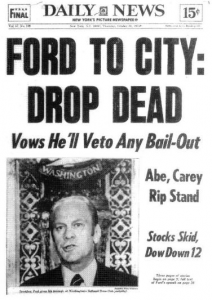Deindustrialization
Since the 1970s, deindustrialization and job loss has posed enormous challenges for many cities. This is the topic of the excerpt from Tricia Rose, which is taken from her groundbreaking book on Hip Hop.
Overview
This section of the course begins a bridge from the Freedom Struggle era to our contemporary moment. In the 1970s and after, the events and ideas of the Black Power movements continued to resonate in many ways. One place we find them is in Hip Hop, a cultural movement born just as Black Power began to wane as a vital force in people’s communities and lives.
Readings
- Tricia Rose, pages 26-35 from Black Noise: Rap Music and Black Culture in Contemporary America (PDF available in GA View “This Week’s Content”).
Reading Guide
Note that this guide is not meant to replace careful study of the entire assigned reading. Instead, this guide highlights some of the important ideas and information in Rose’s text. To do well on our tests, quizzes, and class discussions, you will need a thorough knowledge of the entire reading.
 The infamous response from President Gerald Ford to New York City’s appeal for federal aid.
The infamous response from President Gerald Ford to New York City’s appeal for federal aid.
Viewing
- The Bronx in the 1980s (youtube.com)
This is a compilation of news footage and scenes from Hollywood films. In addition to giving a sense of the urban decay that plagued these neighborhoods, it showcases all of Hip Hop’s original four elements: MC’ing, DJ’ing, b-boying and graffiti writing.